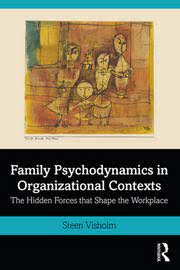The Promoted Sibling
Open and hidden
family dynamics in organisations
Professor Steen Visholm

The Promoted Sibling: Open and hidden family dynamics in organisations.
When the Oedipus complex is extended with siblings more complex dynamics become accessible. You can get access to the typical dynamics in self-governing groups, the dynamics in and under democratic processes, differentiate between parent and sibling transferences, take a closer look at the hidden family dynamics in mergers and much more.
Steen Visholm will present the most essential ideas from his book:
Family Psychodynamics in Organizational Contexts: The Hidden Forces That Shape the Workplace. Routledge, 2021,
Family Psychodynamics in Organizational Contexts: The Hidden forces that shape the workplace by Steen Visholm
Including:
* live interactive seminar presentation
* small group discussion
* plenary questions and discussion
* all for AUD $35
6 – 8 pm Wednesday 7 June, 2023 (Melbourne time)
Register now… don’t miss out!
Day(s)
:
Hour(s)
:
Minute(s)
:
Second(s)
The Promoted Sibling
Open and hidden family dynamics in organisations
Professor Steen Visholm

Prof Steen Visholm PhD
Roskilde University, Denmark
Education: MScA (Psychology), University of Copenhagen 1983, Ph.D., University of Copenhagen University 1995, Approved as specialist and supervisor in psychotherapy (1995) and specialist (2004) and supervisor (2007) in work and organizational psychology. The Danish Psychological Association.
GRC: Leicester Conferences: 1997 (participant), 2005 (training group), 2016 (staff). Staff member on more than 50 and director on more than 25 Group Relations conferences at OPU, MPO, NAPSO and NOV.
Jobs: Clinical psychologist in psychiatry (Slagelse and Hillerød) 1984-1994, Staff Member of OPU (Organizational Psychology, Institute of Group Analysis) 1995-, Associate Professor Roskilde University 1996–2011, Professor MSO (group and organizational psychology), Roskilde University 2011-2020, Professor (psychodynamic group and organizational psychology) 2020-, Director for MPO (Master of the Psychology of Organization), Roskilde University 2001–.
ISPSO: Member since 2004, AM Chair Elsinore 2010, board member 2014-2022, AM Co-Chair 2017 Copenhagen. President 2019-2021.
Other: OPUS associate 2005 -, Gunnar Hjelhjolt Award. 2005. Chair NAPSO 2008 –, participant International Gathering of Programs 2013 -, Review Editor Organisational and Social Dynamics 2015–2022
📆 Dates
Wednesday 7 June 2023
⏰ Session Times
6 – 8 pm 🇨🇰 Melbourne
4 – 6 am (eek!) 🇺🇸 New York
9 – 11 am 🇬🇧 London
1.30 – 3.30 pm 🇮🇳 New Dehli
4 – 6 pm 🇸🇬 Singapore
💷 For only
AUD $35 including seminar, small group
discussion, and plenary discussion.
👩🏻💻 Location
Live interactive online
About NIODA
The National Institute of Organisation Dynamics Australia (NIODA) offers internationally renowned post-graduate education and research in organisation dynamics, and decades of experience consulting with Australian organisations.
The study of organisation dynamics brings together socio-technical and psychoanalytic disciplines to explore the unconscious dynamics that exist in every group, team or organisation. Learning more about these theories, and reflecting on the experience of them, can support leaders and managers to unlock great potential in their organisations, tackling issues through a whole new light.
PO Box 287, Collins Street West,
Melbourne 8007 Australia
+61 (0) 414 529 867
info@nioda.org.au
NIODA acknowledges the Kulin Nations, and respective Traditional Custodians of the lands we work on.
We pay our respects to Elders past and present, and recognise their enduring sovereignty which has, and continues to, care for Country.
NIODA welcomes the Uluru Statement from the Heart’s invitation to walk with Aboriginal and Torres Strait Islander peoples in a collective movement for a better future.

